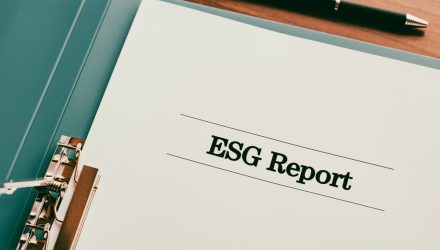If there’s one thing that’s hindered the adoption of ESG investing strategies among registered investment advisors and other investors, it is the lack of clarity and uniformity surrounding ESG disclosures and reporting.
Additionally, it’s not uncommon for some to be put off by the often jargon-heavy, alphabet-soup-intensive nature of ESG reporting. Some organizations are looking to solve those issues and, if successful, that could provide long-term support for ETFs such as the Calvert US Select Equity ETF (CVSE).
To its credit, CVSE is actively managed. The fund’s managers can more nimbly negotiate an increasingly tricky landscape of ESG regulations. Additionally, the fund’s emphasis is domestic large-cap equities. This is an asset class that’s easy to navigate in terms of identifying credible ESG names while spotting “pretenders.”
ESG Reporting Could Be Getting a Boost
There is encouraging movement on the ESG reporting standards front. It could bring positive implications for ETFs such as CVSE.
“The International Sustainability Standards Board and Global Reporting Initiative will jointly launch a pilot project in Singapore Monday to create common ground for Asian companies to report on their environmental, social, and governance impacts,” reported Bloomberg.
Critics might be apt to say movement on ESG standards in Asia may not be germane to goings on in the U.S. And they might be correct. However, the aforementioned effort could have effects on a massive amount of capital housed in ESG funds. It could also provide a template for enhanced ESG reporting and standards in the U.S.
“The initiative is the first of several planned collaborations between ISSB and GRI. With global ESG assets on track to exceed $53 trillion by 2025, making up more than a third of total assets, investors have been increasingly frustrated by the lack of standardization in sustainability reporting that has made it harder to judge a company’s ESG credentials,” according to Bloomberg.
Regardless of region, increased uniformity in ESG reporting standards could provide tangible benefits in a variety of areas. For example, companies could realize cost and time efficiencies by not having to appease multiple ESG “bosses.” Likewise, easing the ESG reporting burden could stoke renewed interest in ESG commitments among high-ranking executives. Additionally, some experts believe that consistency in ESG standards could lead to more consolidation in select industries.
For more news, information, and analysis, visit the Responsible Investing Channel.

